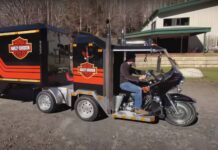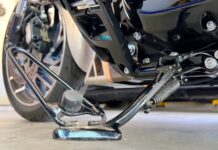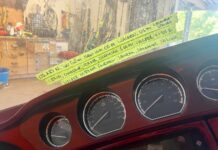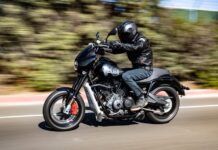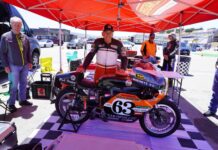When he came back from the service Marvin wanted a basecamp, a piece of property, some dirt where he could live as he wanted without having to answer to anyone. He found it east of Los Angeles, where orange groves, fruit trees and strawberry fields were the norm, where farms had been the same for 50 years, where kids did their chores in the morning and then were free to ride their bicycles and explore whatever they could find.
It was where he had grown up. It was a good place to live.
With his mustering out pay he put a down payment on a two-acre parcel with a small farm house and a barn that was falling down. If there had ever been any farmland attached, it had long since been sold to one of the neighbors.
In the first year he made the house livable, fenced the entire property with a chain link fence, razed the barn and replaced it with a fine workshop. The workshop slowly inherited machinery and tools of all varieties so he hung out a machine shop shingle. At first his income was modest but after a while he became known to the entire community as the man who could fix anything.
It was a simple, uncomplicated life and exactly what he wanted. There was work, he made a few dollars, he owed no one anything; little by little the bills were covered and eventually the mortgage was paid. He had good neighbors, he was his own boss and when he wanted he took off and traveled.
Marvin traveled exclusively by motorcycle. He had several. Even his business “pick-up truck” was an old Harley with a sidecar, where the sidecar body had been replaced with a rig that looked like a flatbed. Marvin collected jobs that fit on the flatbed and if it didn’t fit you had to bring it to the shop yourself.
He loved motorcycles and their simplicity. He loved looking at the machinery, seeing all the parts. He could see inside the carburetor and watch gas and air mingle creating a burning mixture which was then ignited by a spark. That energy pushed down a piston, turned a crankshaft, ran through a clutch and gearbox, tugged on a chain and spun a drive wheel. Listening to an engine, smelling and tasting it he knew exactly if it was right or whether it needed an adjustment.
A basecamp was what he had originally wanted. It was a base of operations where he would work, make money, pay bills, travel anytime he wanted, travel to every state on his Harley-Davidson motorcycle, camp where he wanted, go and come as he pleased. His property, his basecamp, his house and shop allowed him to do exactly that. Marvin thought of himself as a lucky man.
People asked him when he was going to settle down, get a wife and have a family. “When I meet the right girl,” was his standard answer, but he didn’t mean it. He loved the women but he had never seen a marriage that made any sense. So he dated the ladies, showed them a good time, was polite and when it was over everyone was glad that they had met. He was a bachelor.
That was 50 years ago. Today his two-acre piece of dirt is exactly the same as it has always been but the farms and the orchards are gone. They have been sold and divided up a thousand times creating tracts of houses, shopping malls, mini marts, schools, apartments, condos… Marvin now lives in the suburbs. They surrounded him and took over. It all happened slowly, quietly. Every time he left on a trip, upon his return things had changed ever so slightly.
People who knew him asked why he didn’t move. He obviously didn’t fit where he was. “There is no need to move. I am not attached to this dirt. This is just a basecamp. I can pick up and travel anytime I want.”
Not far from Marvin’s house was the high school. The kids walked by his place every day to get to school. The same kids had been walking by in one direction or the other for years. They had grown up knowing Marvin as “the old biker” who could build or fix anything. He had repaired their bicycles, taught them how to adjust their own chains and put air in the tires. Later when some of them had cars he helped keep them running.
It was a Tuesday morning. Marvin was sitting on his porch having a cup of coffee, reading the newspaper, smoking his pipe, listening to music on a portable radio. One of the high school girls who he had known since she had been pushed in a stroller stopped at his front gate and asked, “Morning, Mr. Marvin. How are you today?”
“Fine. Fine morning. How are you?” He answered.
“Could I come up on the porch and talk for a bit?”
“Sure, but aren’t you going to be late for school?”
“No, I don’t have a first period class this semester,” she said as she opened the gate and walked to the porch. Standing on the step she asked, “I’m the new editor of the school newspaper and I thought it would make a great story to interview you. Would you mind?”
“You want to interview me for your paper? What for? Why me?”
“You’ve been here forever, you’ve got the last big piece of property in town, and you remember what it was like when this was all orchards. You’re a fixture in the neighborhood and like the historian for this whole area.”
“Well, I never thought anyone cared about the old days.”
“Oh, no, Mr. Marvin. Knowing about the old days is very cool. Can I ask you some stuff?”
“Sure, what the heck.” Marvin put the paper down, poured another cup of coffee, relit his pipe and said, “Go ahead, take your best shot.”
“Great.” She sat on the top step and took out a pencil and her reporter’s notebook. “Mr. Marvin, what year did you buy this place?” And for the next hour and the next three mornings she asked questions. On the fourth morning her sister and three guys joined her. They sat on the porch and listened to Marvin tell about how it used to be, when you could smell orange blossoms, when you could pick your own strawberries, when there was no mall and no freeway, when you could ride your motorcycle anywhere.
The teenagers listened intently.




